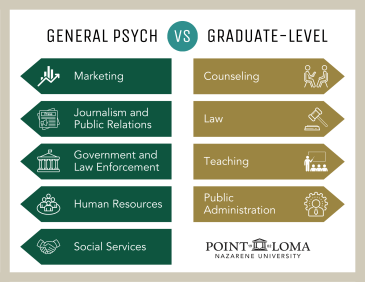
A degree in general psychology is often misperceived as offering limited options, but evidence shows it provides degree holders with a plethora of stable career paths.
It’s safe to say that psychology is one of the most sought after bachelor degree majors in universities today. According to recent data from the National Center of Education Statistics (NCES) and the U.S. Bureau of Labor Statistics, the psychology major was the 6th most popular major in 2020–2021.
Psychology degrees offer degree holders a great number of options when it comes to their careers, from clinical counseling and social work to human resources and law work.
This broad application of the major can lead some to believe that it is a major that isn’t specialized enough to lead to stable career paths.
The key to truly making your psychology degree work is to hone your skills as much as possible towards a specific path. In order to discover that path, however, you have to be aware of the possibilities open to psychology students.
Here’s some basic information on what you can do with a general psychology degree.
What is general psychology?
According to the American Psychologists Association (APA), psychology is “the study of the mind and behavior.” It is a subject matter that spans the entirety of the human experience from how the brain functions, to social psychology, to child development and family psychology.
A degree in general psychology would equip you with the fundamental tools to understand human behavior broadly, and provide you with a springboard to specialize in the field with further education, should you wish to pursue a career in the field itself.
Where do psychologists work?
The APA defines psychologists as individuals who are “professionally trained in one or more branches or subfields of psychology.” In order to be recognized as a licensed psychologist by the APA, you must hold a doctorate degree from an accredited university or school of psychology program.
Psychologists with these credentials tend to go into fields such as clinical psychology or academia. They typically work in behavioral centers, outpatient clinics, hospitals, rehabilitation centers, medical schools or private practices. Psychologists also have very promising salaries — the national average salary in 2022 for psychologists was $85,330 per year.
Do I need a Ph.D. to work in mental health?
If you are someone who does not wish to go through more years of school to get your doctorate degree, but would still like to work within the world of counseling and mental health, then there are many other options that a bachelor’s degree in general psychology can afford you.
For example, a bachelor’s degree in general psychology with an additional masters can set you on the path to becoming a counselor.
It’s important to differentiate between psychologists and counselors. Psychologists undergo specialized training in accredited doctoral degree programs. Counselors, trained in counseling, psychology, social work, or nursing, focus on various areas such as vocation counseling, education, or family counseling.
Counselors can focus on one of many areas including vocation, education, abuse, marriage, family counseling or relationship.
Counselors don’t necessarily need to have a doctorate degree. A master’s degree in your specialized area of choice plus the fulfillment of your state’s licensing requirements will set you up for a great variety of counseling positions.

How do I enter the field of psychology?
To enter the field of psychology you must have at least a bachelor’s degree in general psychology. There are few entry level jobs that a bachelor’s degree in psychology can get you, but in order to become a counselor, therapist, clinical psychologist, school psychologist, researcher or professor, it’s likely you’ll need a master’s degree or a Ph.D.
In addition to a degree, you must also gain some experience. Depending on what you specialize in this could include clinical hours, shadowing another research, or working as an assistant in mental health facilities or private practices.
After you obtain your degrees, hours of experience and fulfill other licensing requirements, you can get your license.
______
Who are you called to be?
Pursue your purpose at PLNU.
______
Careers you can enter with a psychology degree
But what if you want to pursue a general psychology degree but don’t want to necessarily go into the field of psychology? This is actually a more common outcome than you think.
The U.S. Bureau of Statistics supports that psychology graduates often venture out into diverse fields. This is promising should you decide not to pursue psychology after you graduate.
The employment landscape for psychology degree holders is vast and encompasses multiple sectors. According to 2021 data, here are some of the top employment avenues for individuals graduating with a bachelor’s in psychology:
- Substance abuse, behavioral disorder, and mental health counselors (often pursuing advanced degrees)
- Lawyers
- Social workers
- Human resources specialists
- Registered nurses (requiring additional education)
- Educational, guidance, and career counselors and advisors
- Psychologists
- Postsecondary teachers
- Managers
- Elementary school teachers, except special education
Here is some additional information on careers that lend itself well to general psychology degree holders:
- Marketing: Psychology coursework lends itself well to marketing roles, leveraging insights into human behavior for advertising, market research, and sales positions.
- Journalism or Public Relations: Psychology knowledge aids in analytical reporting and relationship-building, making psychology graduates suitable for journalism or PR roles.
- Government and Law Enforcement: Understanding human behavior from psychology studies is beneficial for law enforcement careers, including roles in policing, investigations, or forensics.
- Human Resources: While not an exclusive major, psychology contributes to empathetic HR management through concepts like motivation and human behavior.
- Social Services: psychology is a great major if you wish to enter into the field of social services. Social workers are often hired by government agencies or non-profit organizations to assist underprivileged groups, families or vulnerable members of society. Social workers advocate for policies that provide support for individuals and their families.
Graduate-level education broadens your career prospects:
- Counseling: Graduate degrees in psychology enable careers as therapists, counselors, or school psychologists, offering avenues to address mental health issues.
- Law: Psychology graduates can qualify for law programs and complement legal expertise with insights into human behavior.
- Teaching: While not mandatory, a master's in psychology enhances teaching careers, enriching educational methodologies and subject expertise.
- Public administration: Psychology graduates can excel in public administration, applying social psychology and research skills to government policy implementation.
A general psychology degree serves as a gateway to multifaceted career paths across industries. Graduates can capitalize on diverse opportunities and specializations in areas such as counseling, law, education, and public administration.
Understanding personal career aspirations, aligning them with the many opportunities in psychology, and pursuing advanced education tailored to one's interests are key to flourishing in this dynamic field.
Earning a psychology degree online
Enrolling in an online bachelor’s degree program in psychology brings a wealth of benefits. For one, you’ll no longer be held by geographical limitations. You’ll be able to embrace a learning environment that adapts to your life, not the other way around. In addition, online platforms often foster diverse communities of learners, offering unique perspectives and engaging discussions.
Point Loma Nazarene University (PLNU) offers you an online general psychology degree which you can complete from the comfort of your own home. You can also choose a hybrid model and adapt your schedule to fit your needs.